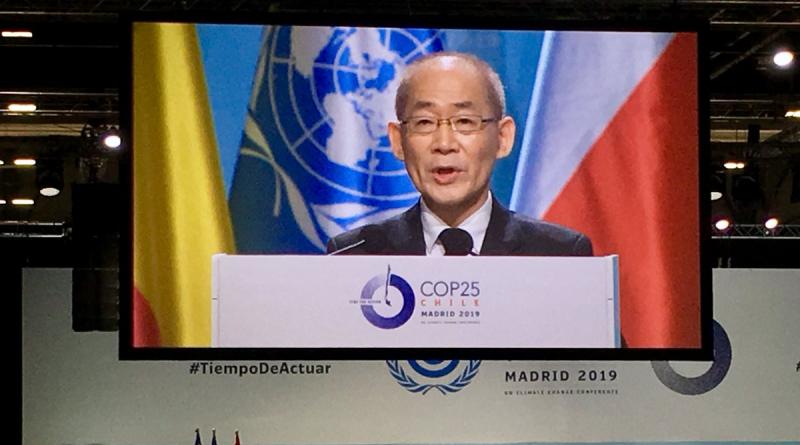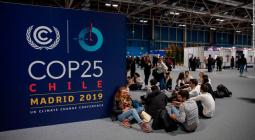Opening of COP 25: Statement by IPCC Chair Hoesung Lee

Excellencies, Distinguished Delegates, Ladies and Gentlemen
It is a great honour for me to address you on behalf of the IPCC at the opening of COP 25.
I would like to express our gratitude to the Government of Spain for hosting this important conference, and to the Government of Chile as COP president for all their preparations.
Let me start by reminding you that our assessments show that climate stabilization implies that greenhouse gas emissions must start to peak from next year.
But emissions are continuing to increase, with no sign of peaking soon.
Our three special reports on warming of 1.5°C, climate change and land, and the ocean and cryosphere in a changing climate indicated that the impacts of current warming are much more severe than previously understood: e.g. accelerating sea level rise and ocean warming, some key ecosystems becoming much more vulnerable, and increasing risks of reaching limits to adaptation.
Climate impacts now and in the future increasingly challenge the adaptive capacity of society and ecosystems.
The three special reports reconfirm the urgent need for immediate reductions in greenhouse gas emissions.
Such immediate reductions would provide the world with more space for cost-effective and sustainable mitigation and adaptation options.
Immediate reductions would generate opportunities for investment in innovation and technologies for higher productivity in energy and resource use, in alternative technologies for a world free of human-caused greenhouse gas emissions, and for investment in know- how for achieving equitable transitions.
These investments would generate powerful benefits spilling over to all sectors of society and the economy, making them cleaner, healthier and more resilient.
And they would help achieve societal goals of poverty eradication and sustainable development.
Failure to achieve such immediate emission reductions will give the world the opposite of all this, in addition to the cascading impacts of a worsening climate.
The world will suffer from stranded assets, the legacy of “business as usual” investment.
The financial sector above all will face greater uncertainty due to risks from climate change and climate change policy.
Food security will be threatened as a result of a worsening climate and increased competition for land, arising from the need to use land as a vehicle for mitigation options.
The world will face increased risks of losses of biodiversity and ecosystem services, and the sustainable development goals such as no poverty, zero hunger and life on land will be compromised.
There will be little room for ecosystem-based adaptation, blue carbon ecosystems, sustainable fisheries and sustainable land management, as these adaptation options are effective only under low-emission pathways.
As Executive Secretary Espinosa has said, if we stay on our current path we risk a sharp rise in global temperatures this century, and I quote: “This will have enormous negative consequences for humanity and threaten our existence on this planet. We need an immediate and urgent change in trajectory… Meeting it is absolutely necessary to the health, safety and security of everyone on this planet – both in the short and long term.”
The IPCC findings support your conclusions.
Later this week we will be discussing our two latest special reports at SBSTA-IPCC special events.
Both confirm that climate change will continue to exacerbate poverty and undermine the livelihoods of the poor and marginalized.
Both point to the need for immediate reductions in greenhouse gas emissions, if we are to stabilize the climate.
They should serve as a wake-up call to us all.
These reports have had an extraordinary resonance, transforming public awareness of climate change, and highlighting the importance of an “all of society” response.
We are humbled that our work is reaching beyond you – our core audience of national governments, policymakers and negotiators – and beyond the scientific community, to other stakeholders at the local and regional level: decision-makers in cities, business and industry, civil society as a whole, young people and the public at large.
But despite this enhanced understanding of climate change it is clear we are not doing anywhere near enough to tackle it.
I assure you the IPCC is working hard to deliver the scientific evidence you need.
We are now midway through the sixth assessment cycle.
And work is advancing on the main Sixth Assessment Report to be delivered in 2021.
The Synthesis Report which will integrate the three AR6 reports and the three special reports will be ready in May 2022.
It will provide policymakers and negotiators with the most up-to-date synthesis of scientific knowledge on climate change as you prepare for the first global stocktake in 2023.
It is my hope that this Synthesis Report will also help integrate our understanding of climate change and the policy response.
This will require inputs from both the science and policy communities.
We appreciate the complexities of taking climate action, arising from the need to address the consequences of action as well as its processes.
We appreciate the challenge you face as a catalyst for the unprecedented change the world will need.
Please tell us what you need from us, and we, the scientific community, will work with you to mend the disconnect between the scientific understanding of climate change and the realities of climate action.
Thank you for your attention.
2 December 2019
IPCC/COP25




